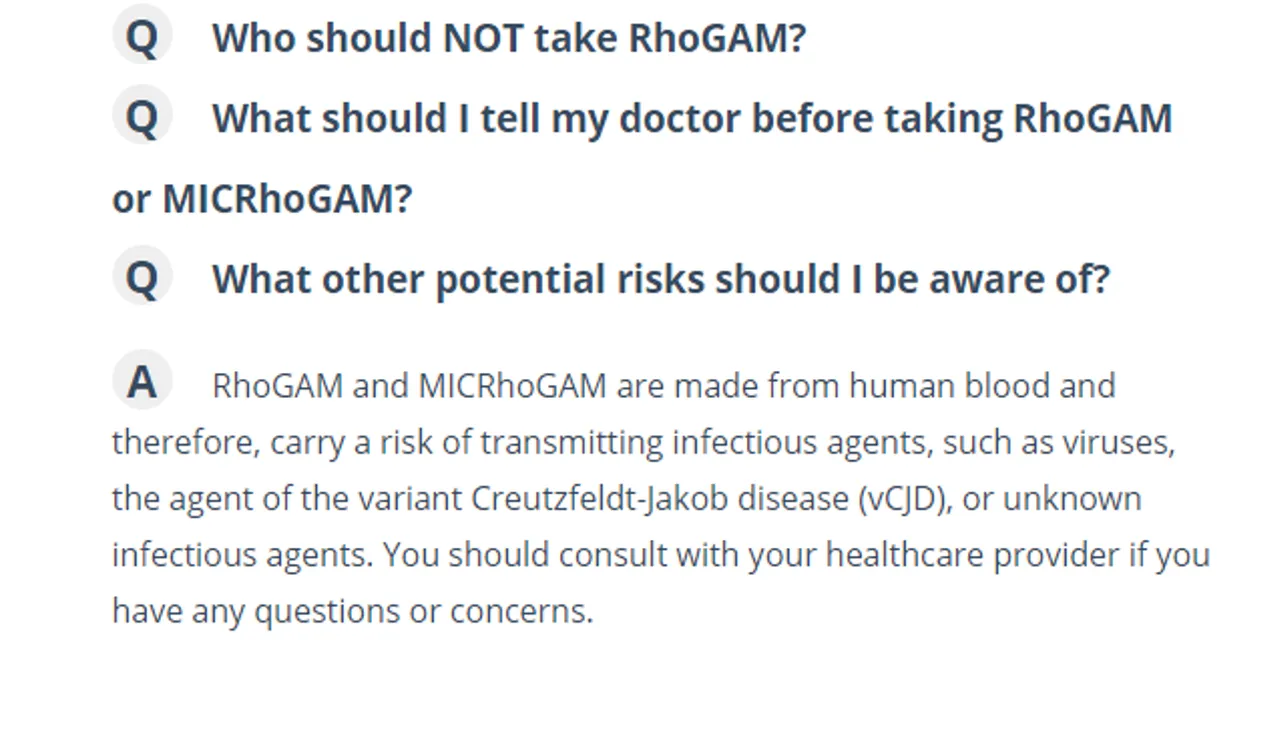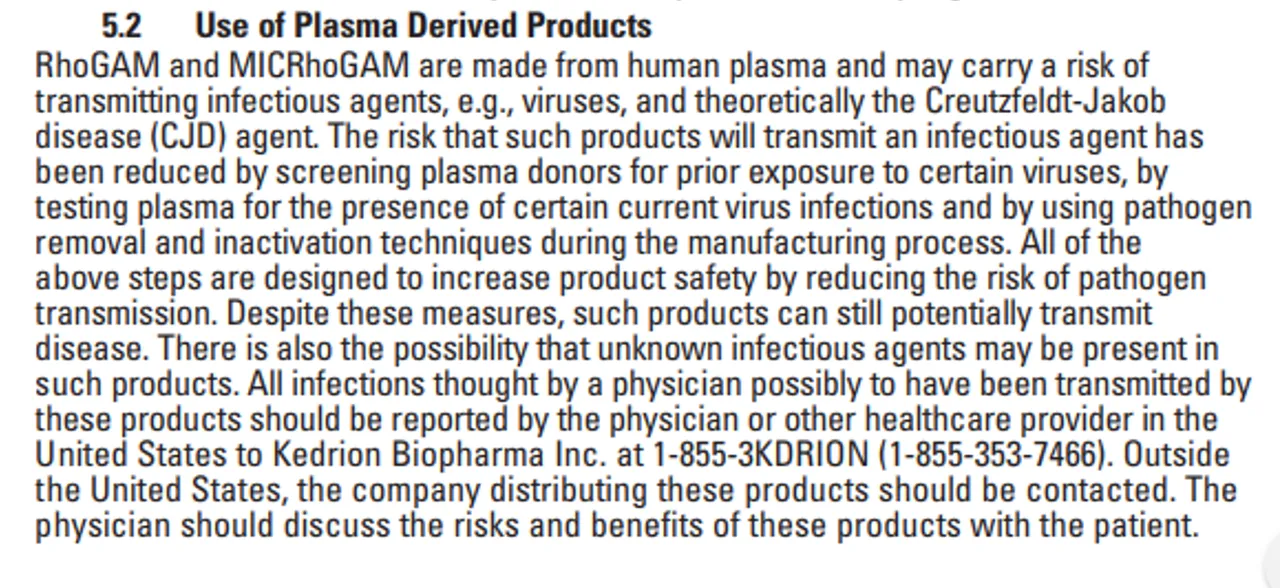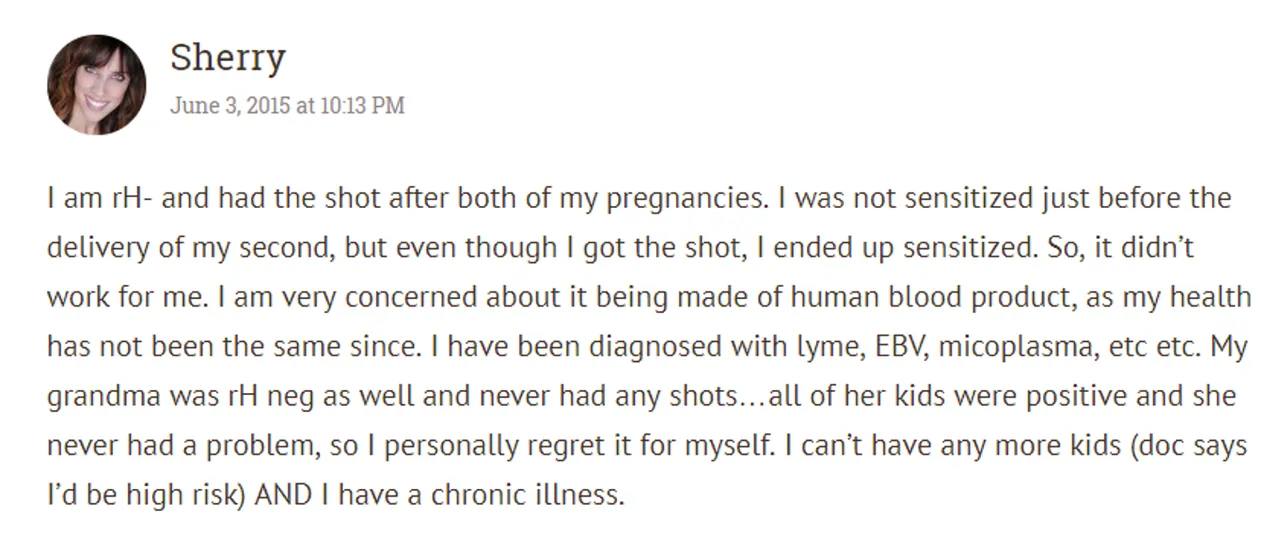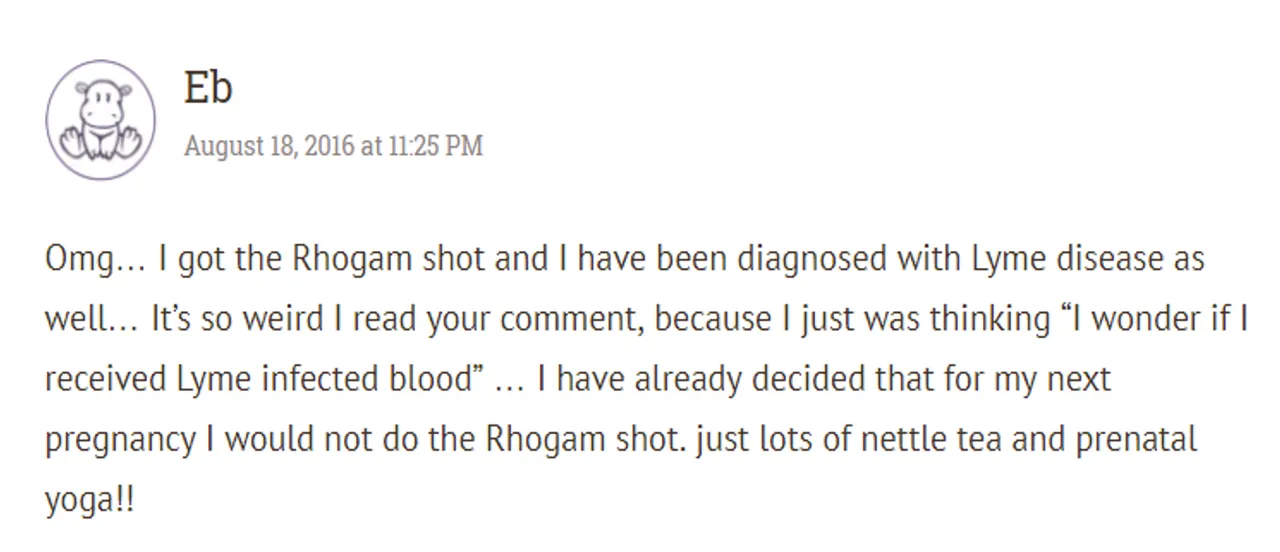Please note: I am NOT a medical professional. This post is not meant as medical advice. I am sharing my experience with you, my research, and the reason behind my choice to not get the RhoGAM shot while pregnant (or after). As always, please, do your research, talk to your partner, and do what is best for you and your family.
My blood type is O-. My Mother’s is as well, so I knew about the RhoGAM shot because she told me to expect it. She got one after I was born. When I was pregnant with my one and only baby my midwife told me that I needed to get the RhoGAM shot due to having a negative blood type.
Pregnant women with negative blood types (and therefore are Rh-) are expected to get the RhoGAM shot. Here’s the reasoning as to why: In the event that the Rh- mom’s blood mixes with the baby’s blood in utero (and the baby’s is a positive blood type) the mother’s blood could attack the baby’s red blood cells, resulting is potentially very serious problems. From the RhoGAM shot’s website, “The mother’s immune system sees the baby’s red blood cells as “foreign” and will try to eliminate them as invaders.”
Usually this does not happen in the first pregnancy and so the first baby is not effected.
If there is blood mixing during birth of that first baby and the mom’s body produces an immune response, called Rh-sensitization, then subsequent babies could be affected. Not getting the RhoGAM shot during the pregnancy for the first baby (if their blood type is Rh+) is a much bigger risk for future babies than it is for the first baby.
So, if Rh-sensitization occurs, all future babies with a positive blood type (and therefore Rh-positive) become at risk for Hemolytic Disease of the Fetus and Newborn (HDFN).
This condition can be very serious is and may cause “anemia, jaundice, and in severe cases, heart failure and possible brain damage” (RhoGAM Website).
So, it’s nothing to mess around with. Absolutely NOONE wants their baby born with any of those possible problems. Modern medicine has found a way to avoid this from happening.
Here is what the RhoGAM website says about their shot, “RhoGAM is purified from human plasma containing anti-Rh (anti-D). RhoGAM is a solution of antibodies, collected from plasma donors. RhoGAM, if given to you at the right time, will prevent your immune system from reacting to your baby’s blood.” The website goes on to say, “Since RhoGAM's introduction in 1968, the incidence of Rh sensitization has decreased dramatically,” which I’m not disputing.
So, now that you know a little bit more about what the shot it, and why it’s given, let’s dive into some of my issues with this shot.
Now you may be thinking, “How could ANYONE possibly refuse this shot!?” Don’t worry, I will thoroughly explain.
So, if you took a high school biology class you probably understand at least a little bit about how genetics work. You probably understand that if both of the baby’s parents have a negative blood type (Rh-) they will NOT have a baby with a + blood type.
Therefore, when the father has a negative blood type there is NO NEED for the shot. However, from my own experience and from reading posts and blogs from other moms on sites like "What to Expect" or "Babycenter," the father’s blood type is not typically asked by doctors or midwifes.
When I was pregnant the midwifes expected me to get the RhoGAM shot at about 26 weeks. My first statement was,
“Well we need to find out my partner’s blood type (he didn’t know it) before just giving me a shot that could be completely unnecessary.”
The midwife looked at me utterly surprised and confused. I guess they don’t get many women questioning this routine shot. After more persuading than I thought was needed, they decided to take my partner’s blood to find out his blood type. I asked the midwife why this wasn’t common procedure. She said that there is a certain percentage of women who are lying about who the father is or aren’t sure, so they just don’t want to take any chances.
“Woah. Okay. Well, I’m 110% sure who the father is and that he’s sitting right here and is willing to get his blood type tested.”
Unfortunately, he was a positive blood type (Rh+). So, the midwives strongly urged me to get the RhoGAM shot. I still did not get it. Don’t worry, I’ll explain, but first, even though I know it’s not pleasant, let’s get a bit more in to the details of the whole “blood mixing” thing.
Not only can blood mixing occur during birth, but it can also happen if some type of abdominal trauma occurs during pregnancy.
Here are a few situations where a Mom and Baby’s blood might mix before or during birth:
• Previous abortions/late miscarriages (after 8 weeks)
• Amniocentesis
• Chorionic Villi Sampling (CVS)
• Trauma to abdomen (car accidents, falls, etc.)
• Forceps
• Vacuum extraction
• C-sections
• Pulling on the cord/placenta after birth, or manual removal of placenta
So, if a trauma does occur, Rh-sensitization is much more likely to have happened. Okay, so you now know that there can be lots of things that may cause blood mixing and there is GOOD reason why the midwifes wanted me to get the shot (even though we didn’t know if my baby had a positive or negative blood type).
I knew ALL of this, and still I declined the shot. Why? Well, I promise I am getting there. But I do want to point out here that if, during my pregnancy, any abdominal trauma had occurred, I would have probably gotten the RhoGAM shot right away. Thankfully, none of the above things happened.
Please note: If you are Rh-negative and pregnant and some sort of abdominal trauma does occur, you can take the flow cytometry test to find out if Rh-sensitizing happened.
So to recap a bit, Rh-negative women are expected to get the RhoGAM shot at about 26-28 weeks to protect the current baby (even if it’s the first pregnancy and they don’t know the father or the baby’s blood type). Then, after the baby is born, the new mother is expected to get another RhoGAM shot within 72 hours after delivery, if her baby is Rh-positive, to protect her future possible Rh-positive babies.
Okay, are you ready? Here it is folks, the main reason why I didn’t get the shot.
Below is a screen shot taken directly from the RhoGAM website.

What the HECK?! When I was pregnant and researching the RhoGAM shot Alarm Bells went off in my head as I read this. It is very clear on their website both in the FAQ and in the fine print on the bottom of the page.
And below you will see a screenshot from the RhoGAM insert on their website, “RhoGAM Full Prescribing Information”

My midwives certainly did not discuss the risks with me. They clearly knew the benefits of the shot, but did not seem at all aware of the risks when I brought them up. I wanted to know if any other Moms were talking about this issue, so I did some google searches. I came across the Mommypotamus Blog, “Should I get a RhoGAM Shot?”, which was very helpful. The author of the blog shares excerpts from the book “Anti-D in Midwifery,” written by Dr. Sara Wickham PhD, RM, MA, PGCert, BA(Hons). You may remember from earlier in this post that RhoGAM is purified from human plasma containing anti-Rh (anti-D). From Wickham’s book:
“Anti-D is a blood product, and as such has the potential to carry such infections. The risks of anti-D in this area are >compounded by the fact that the blood used to make the product is pooled, so blood from one infected donor may end up in >several hundred doses of the product. Several years ago, over 3000 women in Ireland contracted hepatitis C from infected >anti-D (Miesel et al., 1995), and HIV has also been transmitted through anti-D (Dumasia et al., 1989). While both of these >viruses are now screened for and would be rendered harmless by the purification processes involved, the most pressing >concern relates to the presence of as yet unknown viruses, which may not be killed by current treatments. We can clearly only >screen for and treat anti-D for those viruses that we know about and have the effective means to treat.” (Wickham p. 7)
And, in the comment section of the Mommypotamus Blog I saw a few moms wondering if their Lyme disease was the result of the RhoGAM shot. See the screenshots below:


I have no idea if someone can get Lyme from the RhoGAM shot. What I DO know about Lyme (my younger sister has had it for many years) is that it is often misdiagnosed, mistreated, and those who have it can have debilitating, life-long problems like body pain, brain fog, headaches, and serious fatigue—to name a few.
From what I have experienced with my midwifes, and from what I have read from others, most medical professionals never give Rh-negative patients the option to say no to getting this shot, NOR do they mention the risks of possible diseases that can come with it. On top of that, this shot is given to moms without even asking about the father’s blood type.
So, I didn’t get the shot while pregnant. From the research I had done I knew that Rh-sensitization was not likely to occur with the first baby, and therefore it was very unlikely she would have Hemolytic Disease of the Fetus and Newborn (HDFN). Plus, we did not know her blood type. I knew that if she was Rh-positive I would have 72 hours after the birth to decide to get a RhoGAM shot to protect future babies.
Our daughter was born peacefully into this world on a sunny day in early December. When we got home with our perfect bundle, we learned that she was Rh-positive. The midwife urged me to come get the RhoGAM shot before the 72 hours was up.
I cried under the weight of the decion, knowing the possible risks of getting the shot, and knowing what it would mean if I didn’t. Getting the shot would mean protecting possible future babies from the terrible effects of HDFN. It might also mean possibly contracting a rare disease from the shot and potentially spreading it through breastfeeding to my precious new baby.
For me, not getting the shot meant not having any more babies. Getting pregnant would be a huge gamble and I would not want to risk having a baby with HDFN, knowing I could have taken a shot to avoid the terrible effects.
I have two older step-kids and a step-grandkid. Our lives are full. We made the decision that our little girl would be our one and only. My partner was 100% on board with the decision and got a vasectomy shortly after the decision was made.
I did not get the RhoGAM shot after our little one was born. I do not regret the choice.
I am glad Rh-negative moms have the option of getting a shot that increases the chances of them having more than one healthy baby. I very much hope that the shot is safe and will be safe in the future. For me, the risk of it being unsafe was too great. Each mom has to make that decision for herself. My hope is that writing this will help moms make the decision with much more information than the seemingly typical, "Oh you are 26 weeks pregnant and Rh-negative. Here is your RhoGAM shot."
Something else I thought about from the very beginning of my research...I couldn’t help but wonder if Rh incompatibility was one of Mother Nature’s way of helping keep the human population down. My mind wonders about these types of things.
Also, side note-if you are Rh-negative and do a bit of digging (googling) on where this blood type comes from you will quickly find some very interesting theories.
Thanks for reading this VERY long post. I hope you found my research and experiences helpful. Please share this info with Rh-negative women (pregnant or may be pregnant some day). I welcome your comments.